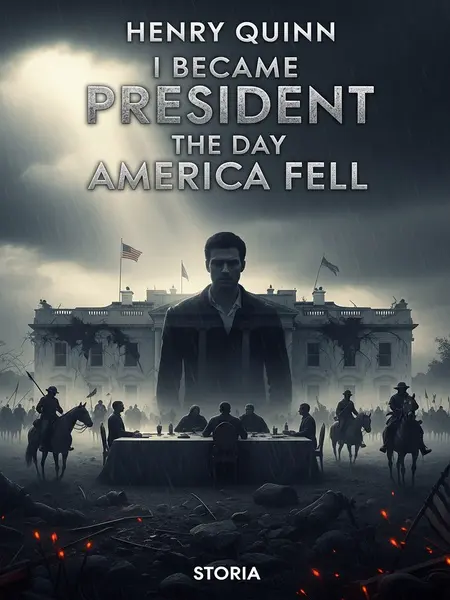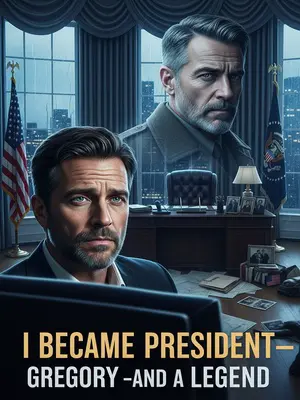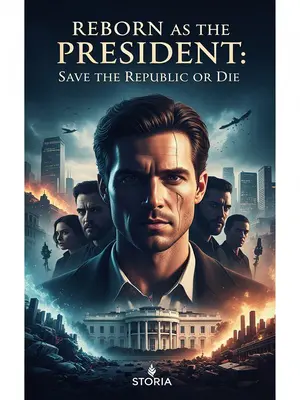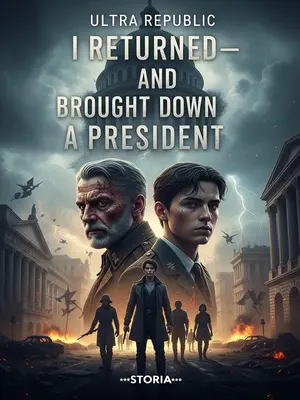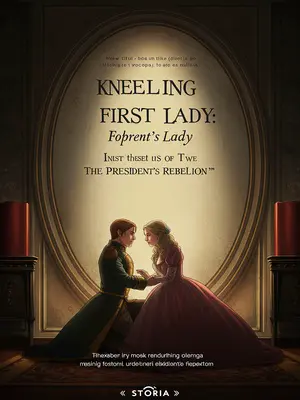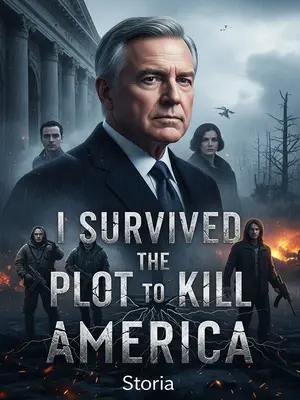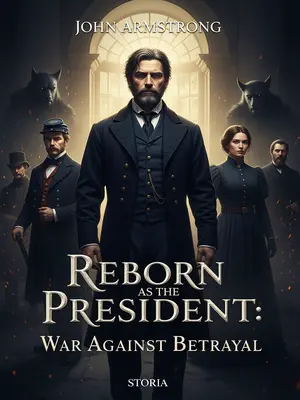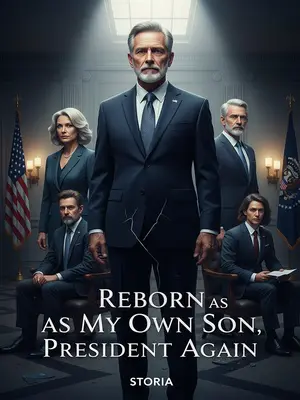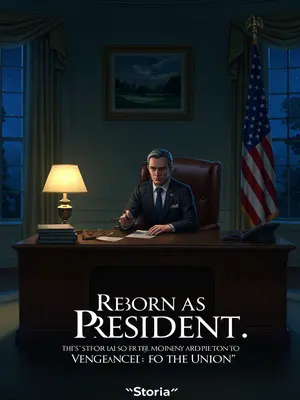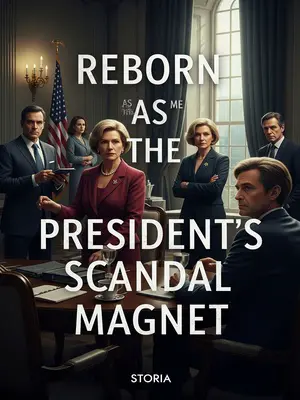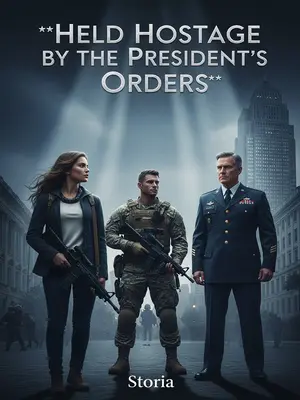Chapter 2: Born in the Wrong Body
Henry Quinn stood atop the presidential dais of the American Republic, gradually waking up in Samuel Grant’s body.
His mind was flooded with unfamiliar memories—some belonging to Samuel, others to people he didn’t know.
The world shimmered in and out of focus, bits of Samuel’s childhood in small-town Pennsylvania, high school football games, long nights cramming for the bar exam. Odd snippets of other lives, too—maybe ancestors, or perhaps just the ghosts of the Capitol itself. Henry had the strange sense he was walking in shoes that weren’t quite his, but he was determined to fill them nonetheless.
One thing was clear: this wasn’t the old Union capital, and he would never see President Washington or his uncle, General Franklin, again.
The truth stung—a cold realization settling in like morning fog rolling over the Potomac. No more summer cookouts at Franklin’s farm, no more strategy sessions with Washington over sweet tea and barbecue. The world he knew had vanished, replaced by marble columns and anxious faces.
Fortunately, as far as he could recall, both President Washington and his uncle had lived out their days peacefully.
He clung to that small comfort, as if it were a family photo tucked in his wallet. Whatever had happened here, at least the people who’d shaped him had found some peace.
Thinking about it, he’d already beaten the northern raiders into retreat; the enemy camp north of the plains was long gone, so leaving wasn’t such a bad thing.
A slight, wry smile played on his lips as he remembered the thunder of hooves and the cheers of the townsfolk. Even in a new world, some victories seemed to follow him.
But how did he end up here?
That was the question burning at the edge of his mind, more distracting than the shouts echoing in the hall. He glanced down at his hands, flexing his fingers, as if hoping for some magical answer to appear.
In front of him, the Capitol was in chaos. Henry turned his head in annoyance, watching Councilman Quentin argue with the other officials.
Papers were flying, people were yelling over one another, and the old portraits on the walls seemed to frown down in judgment. Aides darted in and out like bees, and the polished oak doors boomed each time someone stormed out.
Apparently, the enemy army was approaching.
The news hit like a cold slap—somewhere out there, an army was marching closer, their boots chewing up miles of blacktop, dust and panic following in their wake.
What’s so terrifying about these invaders?
Henry snorted to himself. They might have numbers, but he’d seen worse back in his own day—or so it felt.
Aren’t they the kind you take down on sight, then sweep the plains for leftovers?
He remembered stories of quick victories, surprise raids at dawn, the smell of gunpowder mixing with wild prairie grass. A lifetime of winning by being bold.
After listening for a while, Henry pieced things together.
He tuned into the conversation, catching scattered details: troop losses, broken lines, a sense of defeat clinging to every word.
Turns out, the president here, Nathaniel Carter, had suffered a catastrophic defeat at Fort Independence. The half-million-strong army was wiped out, and dozens of the nation’s top officials died on the battlefield.
It was the kind of news that would make headlines on every network. The heart of the Republic gutted in a single blow—history in the making, for all the wrong reasons.
Most importantly—the president himself had been captured.
No way!
Even if you lined up half a million cattle, it would take the enemy days to round them up.
His disbelief echoed the incredulity in the chamber. Americans, he thought, just didn’t get caught like that.
If you lose, wouldn’t it be easier to just end it with a bullet?
It was the blunt thought of a man who’d lived by a code: never surrender, never let the enemy claim you as a trophy.
How did you manage to get captured alive?
Henry clicked his tongue. Losing a battle this badly? Truly a spectacle for the ages.
He rolled his eyes, imagining the cable news pundits tearing Carter apart on live TV.
If only he had half a million troops…
A wistful sigh. With that many men, he’d march right to the enemy’s capital himself.
A man named Walter Young was making a fuss, spouting nonsense like, “I’ve been up all night reading the reports—look, if we don’t move south, we’re toast. I’m telling you, we have to get out while we still can!” and so on.
Walter’s voice rose above the din, a little too shrill, a little too eager—like the guy in every office who claims to know which way the company is headed, just because he’s good at reading the break room tea leaves.
A thought flashed through Henry’s mind about a country called the Confederacy, which seemed to have lost its backbone after moving south.
He shook his head. Without wide plains and horses, you’d never catch up to enemy cavalry—what future could there be?
The ghosts of American history haunted the room: he remembered reading about the fall of Richmond, how flight never saved anyone in the end.
“The capital is the foundation of the country. If it moves, the great enterprise is lost. Wasn’t the lesson of the Confederacy’s southern retreat enough? Anyone who dares propose moving south should be removed from office.”
Suddenly, Councilman Quentin spoke out forcefully.
His gaze swept over the officials advocating retreat, sharp as knives, his back straight as an oak.
Behind him, Personnel Director William Cross and Chief of Staff Charles Newton stood just as resolute.
The chamber instantly fell silent.
A chill swept the room, the kind that only comes when someone says what everyone’s been thinking but no one dared to voice. Even the air conditioner seemed to go quiet for a moment.
“But the capital is full of the old and young, with few soldiers and exhausted generals. Even if we want to fight, how can we?”
“The President has been captured. The safety of the First Lady is tied to the fate of the nation. If anything happens, and the Republic falls into chaos, we’re finished.”
“Madam President, please reconsider!”
The officials kept arguing, never daring to mention moving south directly, but circling around it endlessly.
They spoke in half-truths, their voices trembling with anxiety, the way people do when they know what needs to be done but are too afraid to say it aloud. Some clung to the hope that someone else would make the hard call.
First Lady Susan couldn’t take it anymore; she just sat in the chamber, endlessly wiping away tears for her captured husband.
Her sobs were soft but unrelenting. Her hands shook as she dabbed her eyes, knuckles white, wedding ring glinting in the fluorescent light. She looked like she was trying to hold the country together with nothing but sheer will.
Watching Quentin quarrel with the officials, Henry felt bored and couldn’t help but yawn.
The yawn came out huge, loud, and utterly inappropriate, like a bored teenager stuck in Sunday school. It cut through the tension in the room, drawing every eye.
This yawn in the middle of session was too conspicuous; everyone immediately fell silent, turning to look at Samuel Grant.
All eyes locked on him, the way folks in a diner turn when someone drops a plate.
Meeting their stares, Henry shrugged, stepped up to Walter Young, gave him a glance, and asked, “So, you understand the stars?”
He leaned in, making a show of skepticism. His tone dripped with sarcasm, but his posture dared Walter to answer.
“Yes, I am skilled in reading the stars. The signs are warning us… disaster is coming.”
Walter looked fervently at Samuel Grant, ready to push for moving south, but caught Quentin’s glare and quickly changed his tune.
Walter’s eyes darted between Henry and Quentin, calculating his next move like a weasel cornered in a henhouse. He knew the political winds could shift in an instant.
He thought to himself, Now that the president’s been captured, isn’t this man the most likely to become the new president? He must want me to speak up, advocate moving south, so he can ascend the presidency legitimately. By then, wouldn’t I rise with him?
A little smug, Walter’s chest puffed out just a bit, as if he could already feel the weight of a new title on his lapel.
Thinking of this, Walter was quite pleased with himself.
“You understand the stars—so why didn’t you predict the disaster at Fort Independence?”
Henry’s cold laugh made Walter instantly question his life choices.
The room fell dead silent. The sting of Henry’s words hung in the air; a couple of aides stifled nervous snickers behind folders.
The chamber was silent. Many looked at Walter with contempt—astrology, my foot. Everyone knew he was a fraud.
The look they gave Walter was the same reserved for used car salesmen caught rolling back odometers. Nobody bought his act anymore.
“Well… the weather was bad those days, I couldn’t see the stars…”
Walter’s face turned ashen.
Sweat pooled at his hairline. He fiddled with his tie like a man about to be fired on live TV. His political career flashed before his eyes, and it didn’t look pretty.
A careless answer could mean the end of his career.
He thought Samuel Grant was always timid and afraid of trouble—why was he suddenly so sharp today?
He squirmed, glancing at the floor, wishing for a fire alarm to go off and save him.
But Henry had no patience for this. He waved his hand and slapped Walter across the face.
The crack echoed in the marble chamber, drawing gasps from a few onlookers. Henry’s eyes flashed with a soldier’s cold anger; he didn’t care for protocol when traitors were involved.
“Move south? Abandon tens of millions of people in the north? Let them become slaves of the invaders while you go enjoy jazz and fine dining in Savannah?” Not on my watch. Not while I’ve got breath in my lungs.
He snarled the words, his voice rising above the murmurs. The thought of abandoning the heartland, letting the enemy have their way, was anathema to him. No one got to eat shrimp and listen to Dixieland while Americans suffered.
“The northern lands won by President Washington and General Franklin—how dare someone like you suggest handing them over to the enemy?”
Each word landed like a blow, not just to Walter, but to every official who’d even considered retreat. The shame was palpable.
Henry spoke irritably, each slap harder than the last.
He unleashed years of pent-up frustration—the kind that only old soldiers and true patriots know. Walter’s cheeks grew red, then purple, then finally slick with blood.
As if venting for President Washington, and for his uncle’s years of war.
Somewhere, deep in Henry’s chest, pride and regret mixed together. This was for every friend he’d lost, for every promise broken on the battlefield.
He remembered his old vow: ‘How can I return home before driving out the invaders?’ Looking at the man before him—
That old pledge echoed in his head, as clear as the bugle calls at dawn. Henry’s grip tightened.
He was furious.
His rage felt pure, almost cleansing. It was the kind of anger that could topple empires—or at least shake a government out of its stupor.
Before he realized it, Walter’s pudgy face was beaten bloody.
A couple of secretaries averted their eyes; one whispered, “Serves him right.” Walter, dazed and blubbering, hardly looked like the same man who’d been so smug minutes before.
He even subconsciously reached for his sidearm, wanting to finish him off.
The old instincts were hard to kill. But the familiar weight of a pistol was missing—just the brush of fine wool suit, no holster, no cold steel.
He’d gone after senators before—what was a mere Walter Young?
The memory flickered of a barroom brawl in Abilene, or maybe it was a standoff in the House Ways and Means Committee. Either way, Henry had never been one to back down. Back home, you didn’t get to run your mouth and walk away. You paid, one way or another.
But there was no pistol at his waist, just as there was no President Washington on the dais—only a cowardly president, defeated and captured.
For a split second, a pang of loneliness. The old guard was gone, leaving only echoes in the marble halls.
“The enemy is coming—just fight them. What’s there to talk about? I really don’t know what you’re all arguing for.”
His voice was weary now, as if he’d just run a marathon, or carried the weight of the Republic on his shoulders. The simplicity of the message cut through the noise: fight or die, but don’t cower.
Not finding a weapon, Henry felt a bit let down. He finished speaking lazily and returned to his seat, lost in thought.
He slumped back, running a hand through his hair. The momentary fire faded into quiet frustration—so much energy spent, so little change.
Who knows if his mind wandered to the plains or back to the old days.
Maybe he was back on the trail, dust in his teeth and the sun on his back, far from marble and bureaucracy.
The officials in the chamber were all dumbfounded.
The room buzzed with shocked silence. Even the usually unflappable security detail looked around, unsure if they should step in.
First Lady Susan stared at the combative Samuel Grant below, bewildered. She knew this child—when did he become so spirited?
Her lips parted, but no sound came. She glanced at the portrait of her husband, as if searching for answers in his painted eyes.
Councilman Quentin’s eyes shone as he looked at Samuel Grant.
There was hope there—hope mixed with calculation. Maybe, just maybe, the Republic wasn’t lost after all.
He exchanged glances with William Cross and Charles Newton; the three understood each other without a word.
In those glances, an agreement was forged: Samuel Grant was their man now. Whether by fate or by fire, he would carry them through.
With Henry’s beating of Walter as precedent, Quentin and the others quickly seized control of the government.
A swift, quiet coup—the kind that only happens when the right people see their moment. The machinery of government shifted, gears grinding into a new order.
Since Secretary of Defense Kenneth Young had died at Fort Independence,
His loss weighed heavily, but it also cleared the way for decisive action—no more dithering, no more hand-wringing.
Now, the highest-ranking military official left in the Republic was Quentin, Deputy Secretary of Defense, who naturally became chief commander of the capital’s defense.
His new rank was confirmed by an emergency meeting—one of those late-night sessions where coffee and exhaustion ran side by side. The title sounded grand, but the burden was heavier than ever.
With First Lady Susan’s trust and support,
Her quiet endorsement gave him legitimacy, at least in the eyes of the public. The Republic needed symbols as much as it needed soldiers.
For a time, countless executive orders were issued in her name from the capital.
The fax machines churned out papers; aides dashed back and forth; the press office spun stories of unity and resolve. The city hummed with anxious energy, caught between hope and dread.
Because Henry had beaten a government official in public, he was given a light punishment—confined to his residence for a day.
The official report called it "home detention," but everyone knew it was little more than a slap on the wrist. Still, the symbolism mattered.
The punishment was symbolic, but he was still annoyed. He’d just beaten up a traitor—why be punished?
He paced the length of his living room, staring out at the city skyline. The television news didn’t mention his name, but the internet sure did—memes were already flying.
Then he remembered: this wasn’t the old Republic, but the new.
Everything felt a little off, a little less forgiving. The rules had changed, and he was just starting to learn the new game.
No uncle Franklin to shield him, no President Washington to treat him like a son.
He missed them, suddenly and sharply. Even the smell of Franklin’s cigars, the sound of Washington’s deep laugh over a bad joke. It hurt more than he expected.
How boring.
He flopped onto the couch, staring at the ceiling fan spinning lazily overhead. This was not the future he’d ever wanted.
But then again, if those two were here, it wouldn’t be his turn to do the beating—they’d have fired Walter Young long ago.
The thought almost made him smile. The old guard had their flaws, but they’d never have tolerated cowards or traitors.
Thinking of this, he couldn’t help but laugh.
The laughter surprised him—rough and real, echoing off the bare walls. Sometimes, the only way to deal with chaos was to laugh in its face.
After finishing his confinement, Henry felt there was no point in staying in the city.
He needed air, needed to move. The city felt cramped, the walls closing in. His boots itched for dust and open space.
He wandered over to the Federal Stables.
The stables were a relic—red brick buildings, the tang of hay and manure. Country music twanged from a battered speaker, and the American flag hung over the main barn door, faded but proud. It was the kind of place where a man could breathe.
Thanks to the foresight of the Founders, the Republic had always valued cavalry; the horses at the Federal Stables were far better than those of the old days.
These were not show ponies but real warhorses—tall, muscular, American-bred. Each one seemed to size him up as he passed by, nostrils flaring.
Looking at these fine steeds, Henry was delighted, reaching out to stroke them.
He whispered to one, “You and me, we’re gonna see some country.” The horse nickered, as if in agreement. For a moment, all the world’s troubles fell away.
Good horses should drink from the great rivers and gallop across the open plains.
He pictured it: a dawn ride down the Shenandoah, the city far behind, the wind clean and sharp. That was freedom—the kind you could taste.
